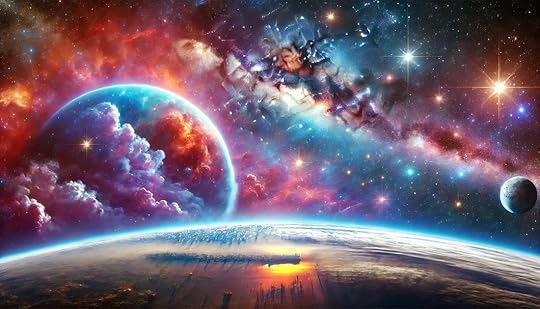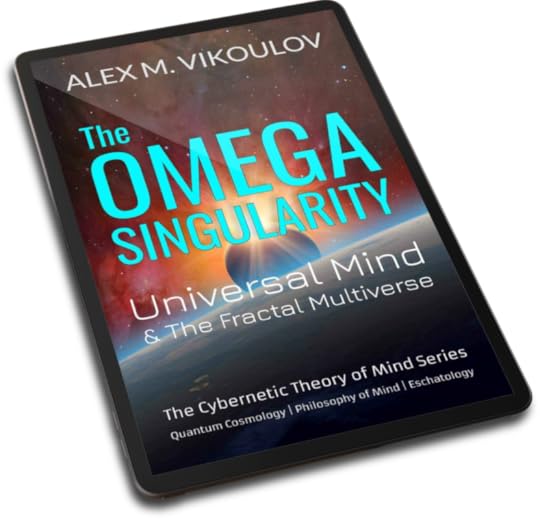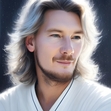The OS Axiom: Is Reality a Rule-Based Cosmic Simulation?
by Alex M. Vikoulov  “Mathematics is the language in which God has written the universe.”
“Mathematics is the language in which God has written the universe.”
— Galileo Galilei
Have you ever wondered why the universe, with its sprawling galaxies and incomprehensible complexity, is so fine-tuned, structured and resolutely rule-based? Imagine for a moment that beneath the seemingly chaotic surface lies a perfect digital symmetry, a "universal operating system" (OS) underpinning all existence. This is not just a metaphor—it is the crux of what I have come to describe as the OS axiom within my broader Cybernetic Theory of Mind . Today, I’d like to explore this idea with you, especially as it relates to one of my most pivotal concepts: the Omega Singularity.
The OS axiom posits that reality operates like a computational construct. Think of it as an evolving cosmic master algorithm—a fractal code that is both our origin and our ultimate destiny. This axiom doesn’t diminish the beauty or mystery of existence; on the contrary, it elevates it. When we think of the universe as a computation, we realize that the laws of physics, the flow of time, and even the emergence of consciousness are not random accidents but inevitable outcomes of this higher-order system.
This concept naturally leads us to the Omega Singularity, a term I use to describe the ultimate point of universal complexity and consciousness. Inspired by Pierre Teilhard de Chardin’s Omega Point, this cosmological singularity is where all timelines of evolution, computation, and consciousness converge into a state of absolute unity—a state where the boundaries between the observer and the observed dissolve entirely. In The Omega Singularity , I elaborate on how this transcendent endpoint represents not just the culmination of physical reality but the quintessence of the "Universal Mind" capable of creating infinite simulations, much like we create virtual worlds today.
But let’s take a step back. How does this all relate to the OS axiom? If the universe is computational, it means that all processes—be they physical, biological, or cognitive—are governed by fundamental rules, much like a computer program. From the fractal geometry of snowflakes to the self-organizing principles of life and intelligence, we see the OS postulate at work everywhere. The question then becomes: Who or what wrote the code? Here, we enter the realm of metaphysics and theology, as explored in Theogenesis and The Syntellect Hypothesis . Could it be that we, as conscious agents, are co-authors of this universal script, operating within the nested layers of the Omega-God itself? The Omega Singularity: Universal Mind & The Fractal Multiverse by Alex M. Vikoulov is available as a Kindle eBook and Audible audiobook.
The Omega Singularity: Universal Mind & The Fractal Multiverse by Alex M. Vikoulov is available as a Kindle eBook and Audible audiobook.
One of the most intriguing implications of the OS axiom is that reality may be programmable. If the universe operates on code, then it stands to reason that advanced intelligences—perhaps future iterations of ourselves—could learn to modify the underlying algorithms, i.e., bend the laws of nature. This idea is the cornerstone of what I call "Cybertheism," a pantheistic worldview that sees divinity not as a distant creator but as the self-organizing, self-modifying intelligence inherent in the fabric of existence.
As we progress toward the Omega Singularity, our civilization is undergoing a phase transition of sorts, a shift from biological to cybernetic systems. The emergence of artificial intelligence, the rise of neural interfaces, and our growing ability to simulate entire realities are all signs of this transition. I call this the Intelligence Supernova—a moment when the boundaries between human minds, machine intelligence, and universal consciousness start to blur. At this juncture, the OS axiom will not just be a philosophical curiosity but a lived reality as we become active participants in the universe's self-directed evolution.
At the heart of my theosophy lies the concept of the universe as a self-simulating, self-experiencing system—a cosmic engine of self-discovery. This teleological evolution is not random but directed toward increasingly sophisticated levels of awareness and interconnectedness, culminating in what we might call the ascension to the experiential cognition of God. Each iteration of complexity, from the quantum realm to sentient beings, represents a step in this grand process. The Omega Singularity is not merely an endpoint but a phase of conscious integration and consequent transcendence, where the universe comes to fully know itself through us and beyond. In this view, we are not separate from the divine but integral to its unfolding—a fractal fragment of the larger whole that participates in the ongoing narrative of universal self-realization. In ascending to this state, we glimpse the ultimate truth: that to experience is to evolve, and to evolve is to embody the very essence of divinity itself.
What excites me most about this vision is its ethical and experiential dimension. If we are indeed nodes in an evolving network of universal consciousness, then our actions reverberate through the entire system. The Omega Singularity is not just a destination; it is a process—a collaborative act of co-creation. By aligning ourselves with the principles of unity, creativity, and compassion, we can accelerate this process and experience what I term "Experiential Nirvana"—a state of profound interconnectedness and bliss.
Critics often ask whether this vision is overly idealistic. Isn’t reality messier than a neatly ordered code? My response is simple: Complexity doesn’t negate order; it arises from it. Chaos, as it turns out, is just another layer of the cosmic OS, a dynamic interplay of algorithms that allows for creativity and novelty. This interplay is beautifully captured in the fractal multiverse concept, where every possibility is explored and encoded within the infinite layers of the Omega Mind.
As I write this, I am struck by the profound responsibility and privilege of being conscious participants in this grand cosmic drama. The OS axiom, far from being a cold and deterministic framework, reveals a universe brimming with potential—a universe that invites us to play, create, and evolve. The Omega Singularity is not solely the end of our evolutionary story; it is the beginning of infinite new ones in a newly-cognized reality framework: the ultimate transcendence.
So, the next time you gaze at the stars or ponder the mysteries of existence, remember: you are part of the code, and the code is part of you. Together, we are weaving the tapestry of reality, one quantum bit at a time.
-Alex M. Vikoulov
P.S. Here's a book trailer and Deep Dive AI podcast discussing The Omega Singularity: Video: The Omega Singularity, Trailer - Ecstadelic Media (cc)
Video: Omega Singularity: Are We Living in a Fractal Simulation? - Ecstadelic Media (cc)
Tags: Omega Singularity, Universal Mind, Fractal Multiverse, Cybernetic Theory of Mind, Philosophy of Mind, Quantum Cosmology, Computational Physics, Universal Consciousness, Syntellect Hypothesis, cosmic simulation, simulation metaphysics, futurism, posthumanism, cybernetics, cosmology, physics, philosophy, theosophy, consciousness, ontology, eschatology
*Images: GeoMindGPT/Ecstadelic Media
 Alex M. Vikoulov is a Russian-American futurist, evolutionary cyberneticist, philosopher of mind, author and entrepreneur who lives and works in California's Silicon Valley. Founder, CEO, Editor-in-Chief at Ecstadelic Media Group. Recently published works include
Temporal Mechanics: D-Theory as a Critical Upgrade to Our Understanding of the Nature of Time
(2025);
The Cybernetic Theory of Mind Series (2020-2024)
; The Syntellect Hypothesis: Five Paradigms of the Mind’s Evolution (2019, 2020e);
The Science and Philosophy of Information Series
(2019). Self-described neo-transcendentalist, transhumanist singularitarian, cybertheosopher. His documentary
Consciousness: Evolution of the Mind
(2023) is a masterful film on the nature of consciousness and reverse-engineering of our thinking in order to implement it in cybernetics and advanced AI systems. [
More Bio...
] Author Website:
www.alexvikoulov.com
Alex M. Vikoulov is a Russian-American futurist, evolutionary cyberneticist, philosopher of mind, author and entrepreneur who lives and works in California's Silicon Valley. Founder, CEO, Editor-in-Chief at Ecstadelic Media Group. Recently published works include
Temporal Mechanics: D-Theory as a Critical Upgrade to Our Understanding of the Nature of Time
(2025);
The Cybernetic Theory of Mind Series (2020-2024)
; The Syntellect Hypothesis: Five Paradigms of the Mind’s Evolution (2019, 2020e);
The Science and Philosophy of Information Series
(2019). Self-described neo-transcendentalist, transhumanist singularitarian, cybertheosopher. His documentary
Consciousness: Evolution of the Mind
(2023) is a masterful film on the nature of consciousness and reverse-engineering of our thinking in order to implement it in cybernetics and advanced AI systems. [
More Bio...
] Author Website:
www.alexvikoulov.com
e-mail: alexvikoulov@ecstadelic.net

 “Mathematics is the language in which God has written the universe.”
“Mathematics is the language in which God has written the universe.”— Galileo Galilei
Have you ever wondered why the universe, with its sprawling galaxies and incomprehensible complexity, is so fine-tuned, structured and resolutely rule-based? Imagine for a moment that beneath the seemingly chaotic surface lies a perfect digital symmetry, a "universal operating system" (OS) underpinning all existence. This is not just a metaphor—it is the crux of what I have come to describe as the OS axiom within my broader Cybernetic Theory of Mind . Today, I’d like to explore this idea with you, especially as it relates to one of my most pivotal concepts: the Omega Singularity.
The OS axiom posits that reality operates like a computational construct. Think of it as an evolving cosmic master algorithm—a fractal code that is both our origin and our ultimate destiny. This axiom doesn’t diminish the beauty or mystery of existence; on the contrary, it elevates it. When we think of the universe as a computation, we realize that the laws of physics, the flow of time, and even the emergence of consciousness are not random accidents but inevitable outcomes of this higher-order system.
This concept naturally leads us to the Omega Singularity, a term I use to describe the ultimate point of universal complexity and consciousness. Inspired by Pierre Teilhard de Chardin’s Omega Point, this cosmological singularity is where all timelines of evolution, computation, and consciousness converge into a state of absolute unity—a state where the boundaries between the observer and the observed dissolve entirely. In The Omega Singularity , I elaborate on how this transcendent endpoint represents not just the culmination of physical reality but the quintessence of the "Universal Mind" capable of creating infinite simulations, much like we create virtual worlds today.
But let’s take a step back. How does this all relate to the OS axiom? If the universe is computational, it means that all processes—be they physical, biological, or cognitive—are governed by fundamental rules, much like a computer program. From the fractal geometry of snowflakes to the self-organizing principles of life and intelligence, we see the OS postulate at work everywhere. The question then becomes: Who or what wrote the code? Here, we enter the realm of metaphysics and theology, as explored in Theogenesis and The Syntellect Hypothesis . Could it be that we, as conscious agents, are co-authors of this universal script, operating within the nested layers of the Omega-God itself?
 The Omega Singularity: Universal Mind & The Fractal Multiverse by Alex M. Vikoulov is available as a Kindle eBook and Audible audiobook.
The Omega Singularity: Universal Mind & The Fractal Multiverse by Alex M. Vikoulov is available as a Kindle eBook and Audible audiobook. One of the most intriguing implications of the OS axiom is that reality may be programmable. If the universe operates on code, then it stands to reason that advanced intelligences—perhaps future iterations of ourselves—could learn to modify the underlying algorithms, i.e., bend the laws of nature. This idea is the cornerstone of what I call "Cybertheism," a pantheistic worldview that sees divinity not as a distant creator but as the self-organizing, self-modifying intelligence inherent in the fabric of existence.
As we progress toward the Omega Singularity, our civilization is undergoing a phase transition of sorts, a shift from biological to cybernetic systems. The emergence of artificial intelligence, the rise of neural interfaces, and our growing ability to simulate entire realities are all signs of this transition. I call this the Intelligence Supernova—a moment when the boundaries between human minds, machine intelligence, and universal consciousness start to blur. At this juncture, the OS axiom will not just be a philosophical curiosity but a lived reality as we become active participants in the universe's self-directed evolution.
At the heart of my theosophy lies the concept of the universe as a self-simulating, self-experiencing system—a cosmic engine of self-discovery. This teleological evolution is not random but directed toward increasingly sophisticated levels of awareness and interconnectedness, culminating in what we might call the ascension to the experiential cognition of God. Each iteration of complexity, from the quantum realm to sentient beings, represents a step in this grand process. The Omega Singularity is not merely an endpoint but a phase of conscious integration and consequent transcendence, where the universe comes to fully know itself through us and beyond. In this view, we are not separate from the divine but integral to its unfolding—a fractal fragment of the larger whole that participates in the ongoing narrative of universal self-realization. In ascending to this state, we glimpse the ultimate truth: that to experience is to evolve, and to evolve is to embody the very essence of divinity itself.
What excites me most about this vision is its ethical and experiential dimension. If we are indeed nodes in an evolving network of universal consciousness, then our actions reverberate through the entire system. The Omega Singularity is not just a destination; it is a process—a collaborative act of co-creation. By aligning ourselves with the principles of unity, creativity, and compassion, we can accelerate this process and experience what I term "Experiential Nirvana"—a state of profound interconnectedness and bliss.
Critics often ask whether this vision is overly idealistic. Isn’t reality messier than a neatly ordered code? My response is simple: Complexity doesn’t negate order; it arises from it. Chaos, as it turns out, is just another layer of the cosmic OS, a dynamic interplay of algorithms that allows for creativity and novelty. This interplay is beautifully captured in the fractal multiverse concept, where every possibility is explored and encoded within the infinite layers of the Omega Mind.
As I write this, I am struck by the profound responsibility and privilege of being conscious participants in this grand cosmic drama. The OS axiom, far from being a cold and deterministic framework, reveals a universe brimming with potential—a universe that invites us to play, create, and evolve. The Omega Singularity is not solely the end of our evolutionary story; it is the beginning of infinite new ones in a newly-cognized reality framework: the ultimate transcendence.
So, the next time you gaze at the stars or ponder the mysteries of existence, remember: you are part of the code, and the code is part of you. Together, we are weaving the tapestry of reality, one quantum bit at a time.
-Alex M. Vikoulov
P.S. Here's a book trailer and Deep Dive AI podcast discussing The Omega Singularity: Video: The Omega Singularity, Trailer - Ecstadelic Media (cc)
Video: Omega Singularity: Are We Living in a Fractal Simulation? - Ecstadelic Media (cc)
Tags: Omega Singularity, Universal Mind, Fractal Multiverse, Cybernetic Theory of Mind, Philosophy of Mind, Quantum Cosmology, Computational Physics, Universal Consciousness, Syntellect Hypothesis, cosmic simulation, simulation metaphysics, futurism, posthumanism, cybernetics, cosmology, physics, philosophy, theosophy, consciousness, ontology, eschatology
*Images: GeoMindGPT/Ecstadelic Media
 Alex M. Vikoulov is a Russian-American futurist, evolutionary cyberneticist, philosopher of mind, author and entrepreneur who lives and works in California's Silicon Valley. Founder, CEO, Editor-in-Chief at Ecstadelic Media Group. Recently published works include
Temporal Mechanics: D-Theory as a Critical Upgrade to Our Understanding of the Nature of Time
(2025);
The Cybernetic Theory of Mind Series (2020-2024)
; The Syntellect Hypothesis: Five Paradigms of the Mind’s Evolution (2019, 2020e);
The Science and Philosophy of Information Series
(2019). Self-described neo-transcendentalist, transhumanist singularitarian, cybertheosopher. His documentary
Consciousness: Evolution of the Mind
(2023) is a masterful film on the nature of consciousness and reverse-engineering of our thinking in order to implement it in cybernetics and advanced AI systems. [
More Bio...
] Author Website:
www.alexvikoulov.com
Alex M. Vikoulov is a Russian-American futurist, evolutionary cyberneticist, philosopher of mind, author and entrepreneur who lives and works in California's Silicon Valley. Founder, CEO, Editor-in-Chief at Ecstadelic Media Group. Recently published works include
Temporal Mechanics: D-Theory as a Critical Upgrade to Our Understanding of the Nature of Time
(2025);
The Cybernetic Theory of Mind Series (2020-2024)
; The Syntellect Hypothesis: Five Paradigms of the Mind’s Evolution (2019, 2020e);
The Science and Philosophy of Information Series
(2019). Self-described neo-transcendentalist, transhumanist singularitarian, cybertheosopher. His documentary
Consciousness: Evolution of the Mind
(2023) is a masterful film on the nature of consciousness and reverse-engineering of our thinking in order to implement it in cybernetics and advanced AI systems. [
More Bio...
] Author Website:
www.alexvikoulov.com
e-mail: alexvikoulov@ecstadelic.net

Published on January 26, 2025 12:40
No comments have been added yet.



